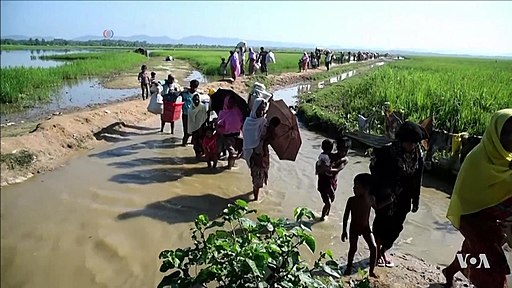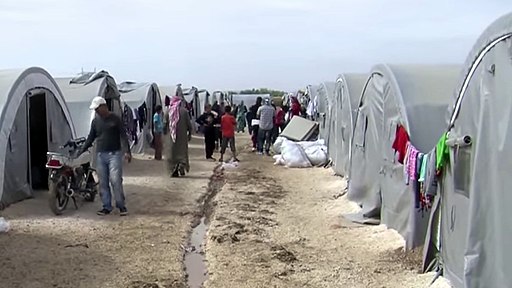Tags
"Gucci Grace", Alberto Fujimori, Corruption, Ferdinand Marcos, Grace Mugabe, Honduran migrant caravan, Hugo Chavez, Jacob Zuma, Jim Yong Kim, Lord Acton, Mass Immigration, Nicolas Maduro, Refugee Camps, Richard Dawkins, Robert Mugabe, Rohingya refugees, Saddam Hussein, Slobodan Milosevic, Suharto, The Selfish Gene, Venezuela
An aphorism: The have-nots want what the haves have; and the haves don’t want the have-nots diluting, polluting or otherwise contaminating what they already have.
A truism: Corruption is the enemy of altruism.
A proverb: Those who live in glass houses shouldn’t throw stones.
An adage: No man is an island.
 Because of copyright restrictions, I cannot insert pictures of the Honduran migrant caravan. Instead, here is a collage of people on the move (refugees) built from images freely available in Microsoft’s clipart library. Here is a shot that, for me, epitomises the plight of the Hondurans
Because of copyright restrictions, I cannot insert pictures of the Honduran migrant caravan. Instead, here is a collage of people on the move (refugees) built from images freely available in Microsoft’s clipart library. Here is a shot that, for me, epitomises the plight of the Hondurans
Mass immigration from poor to rich countries is inevitable. We’ve seen it in the recent mass exodus from countries in the Middle East and along the North African coast into Europe via the soft belly along the Mediterranean coast – Spain and Italy (the Western and Central Mediterranean routes); through Greece (the Eastern Mediterranean route); through Romania and Bulgaria bordering the Black Sea (the Western Balkan route); and even through the countries higher up the eastern border of the European Union – Ukraine, Belarus, Estonia, and Latvia (the Eastern Borders route). And now, we have a caravan of impoverished Hondurans, Guatemalans and probably San Salvadorians, fleeing “poverty, violence and persecution” and powering their way up from southern Mexico with their eyes firmly fixed on the southern border of the United States. Trump has vowed to deny access to the USA for these migrants, and also to withdraw foreign aid to the three Central American countries involved as a punishment for allowing their people to leave in the first place.
We can argue the pros and cons of mass immigration until the cows come home but until the root causes are addressed, there will continue to be large volumes of people seeking a better life in the developed industrialised countries (the so-called first world countries) situated in North America, Western Europe, Japan and Australia. So, what is the root cause? Indeed, is there a single cause we can identify and from which all other causes stem?
 Robert and Grace Mugabe, 2013
Robert and Grace Mugabe, 2013
By User:DandjkRoberts [CC BY-SA 3.0 (https://creativecommons.org/licenses/by-sa/3.0)%5D, from Wikimedia Commons
I believe so. I believe the root cause is corruption. It seems to me that whenever someone comes to power in what we term a third world country (loosely defined to mean the developing countries in Africa, Asia and Latin America), the first thing they do is start to amass a personal fortune by fair means or, more likely, foul. Look at the Mugabes, Robert and Grace. Over the course of thirty-seven years during which Robert Mugabe ruled over the people of Zimbabwe, first as Prime Minister and then as President, he accumulated vast wealth at the expense of the Zimbabweans. Estimates vary as to the wealth of these two people. One report puts Robert Mugabe’s net worth at over $1B (yes, billion). Another report puts Grace Mugabe’s assets at somewhere between $15M – $30M. Her lavish lifestyle has earned her the sobriquet, “Gucci Grace”.
Jacob Zuma, ex-President of South Africa, was constantly accused of corruption, racketeering and profligacy while in power and was finally ousted under a vast cloud of alleged corruption. His net worth is estimated to be $20M. If you enter “Corruption in <any African country>” in a search engine, always the first few websites listed will start with a sentence similar to these:
“Corruption in <any African country> is considered a deeply serious and growing problem.” (Eritrea)
“<Any African country> ranks among the world’s most corrupt countries.” (Somalia)
“Corruption in the <any African country>, once legendary, has diminished in recent years, but continues to exceed corruption in most states.” (Democratic Republic of Congo)
“Corruption is the single greatest obstacle preventing <any African country> from achieving its enormous potential.” (Nigeria)
And so it continues. Try it. Try searching for scholarly articles on “Corruption in <any African country>”. I defy you to find any report claiming corruption is not endemic within the population of a particular African country.
It’s the same, but different, in Latin American countries. Corruption has always been a way of life but so has socialist revolutions and this has given a different flavour to the way corruption has spread throughout each member country. (Parallels with George Orwell’s Animal Farm exist.) Socialism has, for example, crippled Venezuela. President Hugo Chávez, and now Nicolás Maduro, his successor, have been unable to use the country’s wealth, primarily oil, to improve the lives of ordinary Venezuelans and the country is on the verge of collapse with yet another mass immigration into the neighbouring country of Colombia and then on through to Ecuador, Brazil and Peru. One report estimates 2.3 M people (7% of the population) has fled from Venezuela since 2014. Hyperinflation, chronic food shortages, and massive government mismanagement are blamed for what is considered to be one of the largest mass exodus of people on the South American continent since records began.
Asia is similar to Africa. Try my “Corruption in <any Asian country>” test. Here are some of the results I found:
“There are high risks of corruption in most sectors in <any Asian country>. Even though <any Asian country> has the legal framework and a range of institutions to counter corruption, companies may regularly encounter bribery or other corrupt practices.” (Thailand)
“Corruption in <any Asian country> is an extremely serious problem.” (Myanmar)
“Corruption in <any Asian country> presents business (sic) operating or planning to invest in the country with high risks.” (China)
 Rohingya refugees entering Bangladesh, 2017
Rohingya refugees entering Bangladesh, 2017
By Zlatica Hoke (VOA) (Screenshot from the source video) [Public domain], via Wikimedia Commons
But, as Geoffrey Chaucer is reputed to have written in Troilus and Criseyde (1385), those who live in glass houses shouldn’t throw stones. What do I mean? Everyone is corrupt by nature and almost certainly guilty of some form of corruption during their lifetime. Corrupt is defined as being willing to act dishonestly in return for money or personal gain. Against that definition, I am corrupt. I may have fiddled my tax returns in the past. I have taken home, and still have, a stapler bought by a company I once worked for and intended for my use at work, not at home. I have paid tradesmen for work done on my house with cash in hand rather than through a VAT-loaded official invoice. I once, when I was a very young teenager, stole a record from a record store because I didn’t have the money to pay for it. I… You get the picture? Who among us has never acted dishonestly in return for money or personal gain?
“So what?” you say. “Your minor corrupt actions didn’t affect the lives of many, unlike the corruption of Robert Mugabe, Jacob Zuma, Saddam Hussain, Ferdinand Marcos, Alberto Fujimori, Slobodan Milosevic, Suharto and the host of other senior politicians and rulers of countries whose acts of corruption have, indeed, seriously affected the lives of many.” I agree. It’s a question of scale but where do you draw the line? My illegal acquisition of the stapler probably had little effect on the finances of the company I worked for at the time; similarly my theft of a 45 rpm Everly Brothers record probably didn’t impact severely the profits of the shopkeeper, but, the point is, my actions were all based on corruption and my question is, are we corrupt by design (is corruption innate?), or is corruption an acquired trait? If we are offered the opportunity to steal, embezzle, bribe, collude, extort, or patronise (all forms of corruption), will we automatically seize the opportunity, just like I did when I placed the stapler in my briefcase and took it home?
People have written many scholarly articles about the nature of corruption and the effects it has on individuals, organisations and society at large. I don’t plan to repeat what they’ve said but I am interested in the innate versus acquired question. When I google the question, “Is it human nature to be corrupt?”, I find no; yes; maybe; yes, when linked to power; yes, because we have fallen from our original Biblical primitive state of innocence (thank you, Adam!); and yes because of man’s innate survival instincts (Richard Dawkins, The Selfish Gene, 1976).
 Lord Emerich Edward Dalberg Acton, 1834 – 1902
Lord Emerich Edward Dalberg Acton, 1834 – 1902
Public Domain, https://commons.wikimedia.org/w/index.php?curid=1523091
I tend to agree with Lord Acton, who, in 1887, wrote, “Power tends to corrupt, and absolute power corrupts absolutely,” and with Richard Dawkins who claims that our genetic makeup as a survival machine dictates all sorts of selfish behaviours, including corruption.
So, there’s no hope! Given that we are innately corrupt, corruption will always be present in society with corrupt deeds ranging from the trivial to the massively consequential. I can think of no way of ever controlling dictators and tyrants who exercise their right to behave corruptly simply because they can and because there’s no restraining force to police and punish. In December 2013, Jim Yong Kim, Group President of the World Bank, stated, “Corruption is ‘Public Enemy Number One’ in Developing Countries.” He then went on to describe three key elements in the fight against corruption:
“First, we need to improve the way we share and apply knowledge about building institutions with greater integrity; second, we need to empower citizens with information and tools to make their governments more effective and accountable; and third, we need to build a global movement to prevail over corruption.”
These are laudable forces for good but I wonder how successful the World Bank has been at reducing levels of corruption in third-world countries. Where are the measures of success in his three elements? Who assesses the application of his elements? Who is to say that everyone involved in identifying possible corruption is squeaky clean? If we are inherently corrupt, how can we police and judge the alleged corrupt behaviour of others?
What prompted this outburst was the migrant caravan currently moving up through Mexico. There are many other reasons why this group of people are seeking a safe haven: the movement of drugs through their countries and the related gang violence, poverty, inflation, lack of employment opportunities, and many more but at the heart is corruption – the willingness of people to behave dishonestly for money or some other personal gain. I see no light at the end of the tunnel. Money that is funnelled as foreign aid into the third world countries, ostensibly to fund improvement programs such as education, health, infrastructures, clean drinking water, efficient sewage systems, and so on, doesn’t have the desired effect of making the country a more desirable place to live and, therefore, not leave. In fact, you can argue the other way: that most foreign aid is used to fund corruption and therefore exacerbates the very problem it was meant to solve.
Nope; I am sure we are stuck with the problems of mass immigration – into Europe, into the United States, into adjacent countries if religious persecution, civil war or ethnic cleansing is the cause (as is the case with the exodus of the Myanmar ethnic Rohingya into neighbouring Bangladesh, and with the peoples of South Sudan into Uganda). According to The Guardian, 258 M people (one in thirty of the World’s current population) now live outside their country of birth, and The World Migration Report 2018 is forecasting 405 M international migrants by the year 2050. I haven’t checked this forecast (who can?), but, to me, it seems a low estimate. It’s not even a doubling of today’s 258 M figure over the next thirty years.
 Kurdish Refugee Camp in Suruc Turkey
Kurdish Refugee Camp in Suruc Turkey
By Voice of America News: Scott Bobb reports from the Suruç, Turkey/ Kobane, Syrian border; “Turkish Border Towns Hosting Thousands of Kobani Refugees”. (https://www.youtube.com/watch?v=V-QFVCnd7Po) [Public domain], via Wikimedia Commons
We are already seeing a tightening of borders between the haves and the have-nots and I see no significant movements at national or international levels for this reaction to slacken off; quite the opposite, in fact. I think this will result in two things: yet more refugee camps such as those in Lebanon (Palestinians and Syrians), Kenya (Somalians), Bangladesh (Rohingyan Burmese) and Tanzania (Congolese); and more civil wars in the countries left decimated by the exoduses.
One final point. Most of the drugs that flow between Colombia (the main source of home-produced cocaine and imported/exported heroin) and the USA (the main consumer of these, and other drugs) come up through Central America: Colombia – Panama – Costa Rica – Nicaragua – Honduras and San Salvador – Guatemala – Mexico and then across the border into the USA. One estimate puts this route as carrying 60% of the hard drugs that enter the USA. It is also estimated that 9.4% of the population of the USA is using illegal drugs – almost one in ten people. Given that the population of the USA is currently standing at just under 326 million, that’s over 32 million people taking drugs. Admitted, most American drug users are mostly using marijuana (which chiefly comes from marijuana farms in California, not from Latin American countries) but those using harder drugs, such as cocaine, are in fact fuelling the very problem that has caused the poverty and violence, especially, in Central America. So, is drug use the root cause of the Honduran migrant caravan? It depends on how you view the drug user in terms of corruption. Go back to the definition: willing to act dishonestly in return for money or personal gain. I would say that since the consumption of a drug such as cocaine is currently illegal, then the drug consumer is acting dishonestly and for personal gain (the high, or whatever it is, gained through using the drug). Hence, the drug user is corrupt and the trafficking of drugs to feed his or her corruption has stemmed from the corruption and is a major factor in what has caused the Hondurans to seek refuge in the country that has caused their problems. Ironic, huh?
(^_^)

Oh my goodness Ben, where is it all going to end?
LikeLike
It won’t until we come to our senses and realise the folly of actions based on corruption. I’m gonna return that stapler!
LikeLike
That’ll be a ‘brownie point’ for you then Ben!
LikeLike
I’ve been pondering this one – as is my wont. I believe that it is possible to be greedy without being corrupt however when it comes to these evil leaders they are both corrupt and greedy.
I am despairing of mankind or womankind or peoplekind – whatever we are supposed to call the human race these days! Sadly I do not know how the problems can be solved and I can see no end to this world mess during my lifetime.
LikeLike